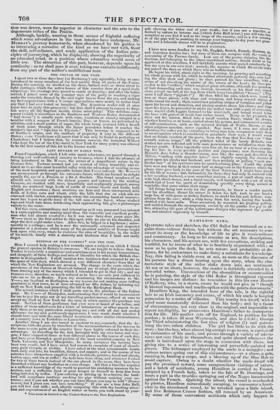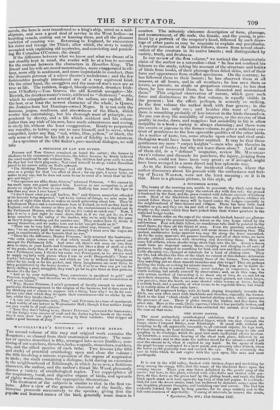DAM LTON KING.
QUITTING tales and sketches, the Old Sailor has ventured on a re- gular three-volume fiction, but without the art necessary to con- struct its story or the knowledge of life to give it vraisembhince and consistency. As long as he remains at sea, his descriptions, his characters, and his scenes are, with few exceptions, striking and truthful, fur he treats of what he is familiarly acquainted with ; as soon as he quits the deck, he sets nature and probability at de- fiance, for be endeavours to make fancy a substitute for knowledge. Nay, this failing is visible even at sea, as soon as the discourse of his persons has a direct bearing upon the story, when the cha- racteristic style of the sailor sinks down into sea sentiment. At sea or on shore, however, the reader is thithfully attended by a powerful writer. Unconscious of the absurdities or monstrosities lie is painting, the style of the Old Sailor is throughout vigorous and his images are distinct : he resembles its this lus owns Moister Oltafferty, who, in a storm, swore he would not give in " though it blowed top-mawls and marlin-spikes with the points downwards."
Hamilton King, the intended hero of the talc, is the rightful heir to an Irish baronetcy and estate, of which his uncle is keeping possession by a series of villanics. This worthy is a dwarf,. with a mind more unnaturally deformed than his body ; and by a tissue of circumstances, not very clear in the original, and impossible to repeat intelligibly, he prosecutes Hamilton's flatter to transporta- tion for life. His mother sets off for England, to petition for his pardon ; is taken ill near Weymouth, and dies in a field ; George the Third administering the last rites of religion (!) and patron- izing the two infant children. The girl has little to do with the story ; but the boy, when almost big enougll to go to sea, is carried off by emissaries of his uncle, and passes through a variety of adven- tures not very likely in themselves, and quite absurd whenever the uncle is introduced upon the stage in connexion with them, but giving rise to a series of interesting and powerfully-painted sea pieces. The kidnapper employed by the uncle is a smuggler; and various scenes spring out of this circumstance,—as a chase, a gale, running in, landing a cargo, and a blowing up of the Blue Bob to avoid capture. Owing to a doubt whether the uncle dwarf will pay the promised reward, some compunctious visitings of nature, and a batch of accidents, young Hamilton is carried to France, adopted by a French lady, taken to the Isle of St. Domingo, and bears a part in the troubles springing out of the Negro insurrection against the French. Quitting the island, the vessel is overhauled by pirates, Hamilton miraculously escaping, to encounter a hurri- cane in the abandoned vessel, to be wrecked upon a little island, and live Robinson Crusoe fashion, till rescued by an American. By some of those convenient accidents which only happen in
novels, the hero is next transferred to a king's ship, rated as a mid- shipman, and sees a good deal of service in the West Indies—as boarding vessels, cutting out or burning them, and all the pleasant varieties of coasting war. Returning to England, he encounters his sister and George the Third ; after which, the story is mainly occupied with explaining old mysteries, and convicting and punish-
ing Sir Cornelius O'Connor, the dwarf. If the difference between what we know and what we dream of is
not steadily kept in mind, the reader will be at a loss to account for the contrast between the characters in Hamilton. King. The Dwarf and his wife are moral monstrosities, more exaggerated in vil- lanv, more silly in sentiment, and more improbable in conduct, than the dramatispersonae of a minor theatre's melodrama ; and the few flishionables passingly introduced arc of a very equivocal kind. On the other hand, the smugglers and the men-of-war's men are as true as life. The ruthless, dogged, bloody-minded, drunken Irish- man altafferty—Tofu Graves, the old Kentish smuggler—Mr. Herrick, the drunken master's mate, addicted to "dictionary" words, which he misapplies—and several of the sailors, are capital. But the best, or at least the newest character of the whole, is Quaco, the Jamaica-born but Domingo-owned Negro. It is not only the humour, jargon, readiness, and shrewdness of the Black, which render him entertaining ; but his thorough want of principle, en- gendered by slavery, and a life which accident and his colour, rather than any wish of his own, have made adventurous and roving, is nicely hit, without the least exaggeration. Ready to perpetrate any rascality, to betray any one to save himself, and to serve, when compelled, under any flag, "red, white, blue, yellow," or black, the only sense of virtue he has left is a sort of fidelity to his mistress.
As a specimen of the Old Sailor's pure nautical dialogue, we will take
A SMUGGLER ON LAW AND DUTIES.
Peterson and Tont Graves remained on board the cutter ; the former in obedience to his commander's directions, the latter because he firmly believed the vessel would not be safe without him. The children had gone early to rest, for they had lost their playmate ; Ned cried himself to sleep, whilst Hamilton joined in his sorrow solely on Ned's neeount. " I'm thinking, Muster Peterson," said old Toni, " that Muster Repartee owes us a grudge for that 'ere affair at Brest ; for my part, I never bears no malice to any one, but he does not seem to me to come of a breed that 'ud for- give and forget."
"Our opinions are alike there, Graves," returned Peterson. "We cannot be too much upon our guard against him. Lawless as our occupation is, at all events we ought to be true to one another. Rafferty has more of the tiger in Liar than any man I ever knew."
"I don't know what you call lawless, Sir," said Graves, somewhat offended at his honesty being suspected, "but to my notion of things, we acts more by the rule of right than them as makes so much palavering about law. They've a Parliament House and a customhouse here in Ireland, as well as they have in England ; and all the money as they gets in the customhouses is shared out in the Parliament Houses, where they tell me it's 'catch as catch can.' Now, I take it we've a just right to sonic share, that is, if we can get it ; so, if we helps ourselves to the valley o' the 'tootles, why we're only doing the same as they'rt doing—looking out for number one. They makes laws to divide it among theiiselves, and we makes laws not to let 'em get hould on it."
"There can he very little difference to us either way, Graves," said Peter- son ; "we are merely paid for our services; though 1 must own the wages are good, in consideration of the hazards that we run."
"There lies the difference, Muster Peterson," drily returned the boatswain ; "the extra wages comes out o' that which would otherwise be served out amongst the Parliament folk. And arter all, there's not none on 'em, from stem to stern, in your Lords and Commons, but likes a drop of stuff, or a bit of dry goods, dooty free, if so lie as they can get it upon the sly. Why, there
was a Parliament man, I thinks his name was Pennypunt, as we always used to supply reg'larly with pieces when I was in owld Dangerliclrl's ' None so
Lucky,' belonging to Folkstun ; and which on 'errs is without his bangdanna either for his neck or for his pocket, and them bangdannes arc next thing to being prohibitated by the heavy (tootles. Well, if so be as they can get 'cur for thirty shilling a piece smuggled, they won't go fur to give three or four guineas, because it's the law."
"And so by your reckoning, Tom, conscience is sacrificed to pelf," said Peterson, laughing, "and therehire we of the contraband sell our consciences as well as our labour."
"Why, Muster Peterson, I ar'n't possessed of faculty enough to make any particular diskrimmagement iu the religion of the business, but it does seem to my thinking out o' reason to suppose sic' a thing, 'Imse why ? we do for con- science sake that which they dpi again their consciences—for we sticks by our law, whilst they breaks thorn."
"A very nice distinction, truly, Tom," said Peterson, in a tone of merriment. "And worthy of any lawyer in Westminster Hall ; though 1 fear neither Judge nor jury- would be of your opinion." "'Kase they don't belong to us, Muster Peterson," answered the boatswain; "if the Judges were owners of craft and the Juries reggae hands at the trade, they'd soon show 'on right from wrong by their vardicks. Our skipper ud make a good foreman of Jury."



























 Previous page
Previous page